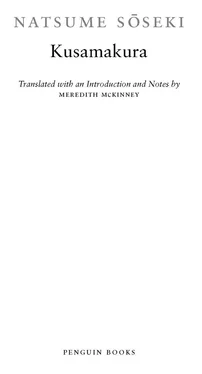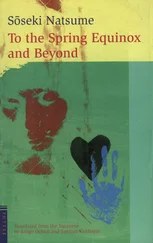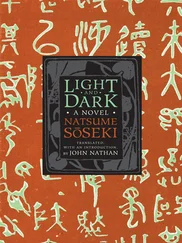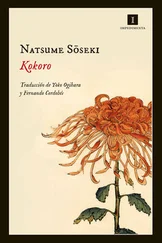Natsume Soseki - Kusamakura
Здесь есть возможность читать онлайн «Natsume Soseki - Kusamakura» весь текст электронной книги совершенно бесплатно (целиком полную версию без сокращений). В некоторых случаях можно слушать аудио, скачать через торрент в формате fb2 и присутствует краткое содержание. Жанр: Старинная литература, на английском языке. Описание произведения, (предисловие) а так же отзывы посетителей доступны на портале библиотеки ЛибКат.
- Название:Kusamakura
- Автор:
- Жанр:
- Год:неизвестен
- ISBN:нет данных
- Рейтинг книги:4 / 5. Голосов: 1
-
Избранное:Добавить в избранное
- Отзывы:
-
Ваша оценка:
- 80
- 1
- 2
- 3
- 4
- 5
Kusamakura: краткое содержание, описание и аннотация
Предлагаем к чтению аннотацию, описание, краткое содержание или предисловие (зависит от того, что написал сам автор книги «Kusamakura»). Если вы не нашли необходимую информацию о книге — напишите в комментариях, мы постараемся отыскать её.
Kusamakura — читать онлайн бесплатно полную книгу (весь текст) целиком
Ниже представлен текст книги, разбитый по страницам. Система сохранения места последней прочитанной страницы, позволяет с удобством читать онлайн бесплатно книгу «Kusamakura», без необходимости каждый раз заново искать на чём Вы остановились. Поставьте закладку, и сможете в любой момент перейти на страницу, на которой закончили чтение.
Интервал:
Закладка:
No flower is more deceptive. Every time I see a wild camel ia in flower, I think of witchery—a bewitching woman who draws people in with her black eyes, then quickly slips a smiling poison into their unsuspecting veins. By the time they realize the trap, it is too late.
When my eye fal s on the camel ia blooms on the far shore, I think to myself, Yes, better if you had not seen. The color of that flower is no mere red. In the far recesses of its dazzling gaudiness lies some inexpressible sunken darkness. The sight of a pear blossom sodden and despondent in the rain wil provoke a simple pity; a cool y enchanting aronia blossom in moonlight cal s forth only delighted affection. But the sunken darkness of the camel ia is of a different order. It has a terrifying taste of blackness, of venom. And yet, with such darkness down there at its core, it decks out its surface in most flamboyant bright display. What’s more, it does not set out to entice or even to attract the human eye. Flowers open and drop, drop and open, over the passage of how many hundred springs, while the camel ia dwel s on in tranquil ity deep in the mountain shadow, unseen by mortal eyes. A single glance, and al is over! He who once lays eyes upon her wil in no way escape this lady’s bewitchment. No, the color of that flower is no mere red. It is like the red of a slaughtered criminal’s blood, drawing the unwil ing eye and fil ing the heart with unease.
As I watch, one of these red creatures plops onto the water. In al the quietness of that spring moment, only this flower has motion. A little while later another drops. These flowers never scatter their petals when they fal . They part from the branch whole and unbroken. The parting is so clean that they may strike us as admirably resolute and unclinging, yet there’s something malignant in the sight of them lying whole where they have fal en. Another drops. If this continues, I think, the pool’s water wil grow red with them; indeed, the area surrounding these quietly floating flowers seems already tinged with crimson. There goes another. It floats there so stil that one can scarcely guess whether it has landed on solid earth or on water. Another fal s. Do they ever sink? I wonder. Perhaps the mil ion camel ia blooms that fal through the years lie steeped in water til the color leaches from them, til they rot, and final y disintegrate to mud on the bottom. Perhaps thousands of years hence and unbeknownst to men, al the fal en camel ias wil eventual y fil this ancient pool til it reverts to the flat plain it once was. And now yet another tumbles to bloody the water, like a human soul in death. And another. A little shower of them plops to the water. Endlessly, they fal .
I wander back and have another cigarette, thinking idly as I puff that this might be a scene for my painting of the beautiful floating woman.
Nami’s joking words at the inn yesterday come snaking insidiously back into my memory. My heart rocks like a plank on a high sea. I wil use that face, float it on the water beneath that camel ia bush, and have the red flowers fal on it. I want to give a sense of the flowers fal ing eternal y over the eternal y floating woman—but can I achieve this in a picture? In Lessing’s Laocoön —but no, who cares what Lessing said? It doesn’t matter whether I choose to fol ow principles, what I’m after is the feeling. Stil , remaining within the human realm, while seeking to express a sense of eternity that transcends the human, is no easy matter.
The face is the first problem. Even if I borrow her face, that expression of hers won’t do. Suffering would dominate, and that would ruin everything. On the other hand, too great a sense of ease would also destroy the effect. Perhaps I should choose a different face altogether. I count off various possibilities, but none are suitable. Yes, Nami’s face does seem to be the right one. Yet something about it isn’t quite satisfactory. This much I know, but just where the problem lies is unclear to me, and consequently I can’t simply change that face on some fanciful whim.
What would happen if I added a touch of jealousy to it? I wonder. No, jealousy has too much anxiety in it. What about hatred, then? No, too fierce.
Rage? But that would wreck the harmony completely. Bitterness? No, too vulgar, unless it had a poetic air of romance to it. After pondering this and that possibility, I final y light on the answer: the one emotion that I’ve forgotten to include in my list is pity. Pity is an emotion unknown to the gods, yet of al the human emotions it is closest to them. In Nami’s expression there is not one jot of pity. This is its great lack. When on an instant’s impulse that emotion registers on her face, that wil be the moment when my picture is complete. But when might I ever see this happen? The usual expression to be seen on that face is a hovering smile of derision and the intently furrowed brow of someone with a frantic desire to win. This is quite useless for my purpose.
A rustling crunch of approaching footsteps shatters my ideas for the painting wel before they have arrived at a final form. Looking up, I see a man in tight-sleeved workman’s clothing tramping along through the dwarf bamboo with a load of firewood on his back, making toward Kankaiji temple. He must have come down from the nearby mountain.
“Lovely weather,†he says, taking off the little towel wrapped around his head and greeting me. As he bows, light flashes along the blade of the hatchet thrust into his belt. He’s a strapping fel ow, whom I guess to be in his forties. I feel I’ve seen him before somewhere, and he too behaves with the familiarity of an old acquaintance.
“You paint pictures too, do you, sir?†he asks. My painting box is open beside me.
“Yes, I came along hoping to paint the pool. It’s a lonely sort of place, isn’t it? No one passes this way.â€
“That’s true. It’s certainly deep in the hil s here. But tel me, sir—you’d have had a good soaking coming over the pass after we met the other day, I should think.â€
“Eh? Ah yes, you’re the packhorse driver I met, aren’t you?â€
“Yes. This is what I do, cut firewood like this and take it down to the town,†says Genbei. He proceeds to lower his bundle to the ground and sit on it. A tobacco pouch comes out—an old one, whether paper or leather I can’t tel . I offer him a match.
“So you cross that pass every day, eh? That’s hard work.â€
“No, I’m quite used to it, real y. And anyway, I don’t go over every day. It’s once every three days, sometimes even four.â€
“I wouldn’t want to do it even once every four days, I must say.â€
He laughs. “Wel , I’m sorry for the horse, so I try to keep it down to about every four days.â€
“That’s good of you. So the horse is more important than you are, eh?†I remark with a laugh.
“Wel , I wouldn’t go that far. . . .â€
“By the way, this pool strikes me as very old. How long can it have been here?â€
“It’s been here a long while.â€
“A long while? How long?â€
“A very long while, believe me.â€
“A very long while? I see.â€
“I’l tel you this, it’s been here since the Shioda girl threw herself in a long while ago.â€
“You mean the Shiodas who run the hot spring inn?â€
“That’s right, yes.â€
“You say the girl threw herself in? But she’s alive and wel , is she not?â€
Читать дальшеИнтервал:
Закладка:
Похожие книги на «Kusamakura»
Представляем Вашему вниманию похожие книги на «Kusamakura» списком для выбора. Мы отобрали схожую по названию и смыслу литературу в надежде предоставить читателям больше вариантов отыскать новые, интересные, ещё непрочитанные произведения.
Обсуждение, отзывы о книге «Kusamakura» и просто собственные мнения читателей. Оставьте ваши комментарии, напишите, что Вы думаете о произведении, его смысле или главных героях. Укажите что конкретно понравилось, а что нет, и почему Вы так считаете.












